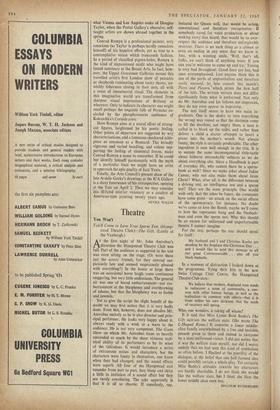Theatre
You Won't You'll Come to Love Your. Sperm Test. (Hamp- stead Theatre Club.)--The Gift. (Lately at the Vanburgh.) A Tthe first night of Mr. John Antrobus's diversion the Hampstead Theatre Club was full. Part of the audience as suggested in the text was even sitting on the stage. (Or were these just the actors' friends, for they entered sus- piciously late and seemed suspiciously pleased with everything?) In the house at large there was an occasional horse laugh, some continuous sniggering, but very little enthusiasm. The general air was one of bored embarrassment—not em- barrassment at the blasphemy and overthrowing of taboos, but that the blasphemy was so feeble and juvenile.
Yet to give the script the slight benefit of the doubt we may first notice that it is very badly done. Even this, however, does not absolve Mr. Antrob'us entirely as he is also director and prin- cipal performer. He looks very happy about it, always ready with a wink or a wave to the audience. He is not very competent. The Goon Show on which Mr. Antrobus leans so heavily succeeded as much by the sheer virtuoso tech- nical ability of its performers as by its sense of the ridiculous. It would introduce a series of extraneous noises and characters, but the characters were funny in themselves, one knew when they had changed, and the sound effects were superb. All four of the Hampstead cast meander from part to part, they bleep and chirp a little in imitation of a sound effect but they are rarely convincing. The joke apparently is that it is all so chaotic. If somebody, say, imitated the Queen well, that would be acting, conventional and therefore retrogressive. If somebody cared for voice production or about making every line heard, that would be to over- respect the audience and therefore unforgivably reverent. There is no such thing as a climax or even an ending in any sense that we know it. Just, with a winning smile, 'Well, that's all,• folks, we can't think of anything more. If you can you're welcome to come up and try.' Timing is very bad throughout. Good lines are lost, bad ones overemphasised. Lest anyone think this is one of the perils of improvisation and therefore easily excused, let him consult this month's Plays and Players,* which prints the first half of the text. The written version does not differ significantly from what is performed. Not only do Mr. Antrobus and his fellows not improvise, they do not even appear to improvise.
The text itself seems to have two main in- gredients. One is the desire to turn everything the wrong way round so that the dustmen come to fill the dustbins, not empty them, a man is called in to block up the toilet, and rather than deliver a child a doctor attempts to insert a piano into the mother's womb. Not always funny, the style is certainly predictable. The other ingredient is seen well enough in the title. It is to sustain the same inconsequential tittle-tattle about hitherto untouchable subjects as we do about everything else. Since a bloodbank is part of everyday life, why cannot there be a sperm- bank as well? Since we make jokes about Julius Caesar, why not also make them about Jesus Christ? What, after all, is the difference between a driving test, an intelligence test and a sperm test? They are the same principle. One would wish only that the jokes be funny, the comments have some point—an attack on the social effects of the spermocracy, for instance. No doubt we've come to love the Bomb, maybe we'll come to love the supersonic bang and the Ombuds- man and even the sperm test. Why this should be an excuse for unformed and unperformable theatre I cannot imagine.
For the rest, perhaps the text should speak for itself :
My husband and I and Christine Keeler are standing by the fireplace this Christmas Day ... and I would like to send this message to all our great Commonwealth . . . piss off you black bastards.
In a moment of distraction I looked down at the programme. Tying their kite to the new Swiss Cottage Civic Centre, the Hampstead Theatre Club state:
We believe that modern, displaced man needs to rediscover a sense of community, a one- ness with other human beings, as well as the realisation—in common with others—that it is from within his own darkness that the seeds of recovery will spring.
Who, one wonders, is taking off whom?
It is said that Miss Lynne Reid Banks's The Gift satirises the welfare state. (Slie wrote The L-Shaped Room.) It concerns a lower middle- class family overwhelmed by a free and invisible present given to them and indeed to everyone by a semi-uniformed visitor. I did not notice that it was the welfare state myself, nor did I worry unduly that we had seen this kind of symbolism so often before. I flinched at the puerility of the dialogue, at the belief that one half-formed idea could possibly sustain a whole play. Yet certainly Miss Banks's attitudes towards her characters are hardly charitable. I do not think she would like the welfare state, but I think she likes the lower middle class even less.
MALCOLM RU1 HERFORD






































 Previous page
Previous page